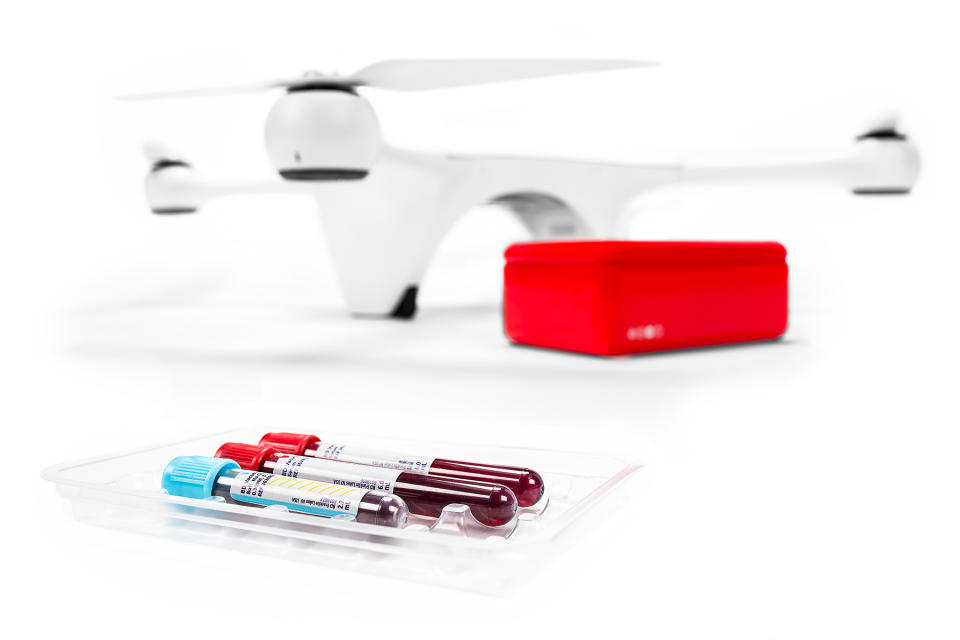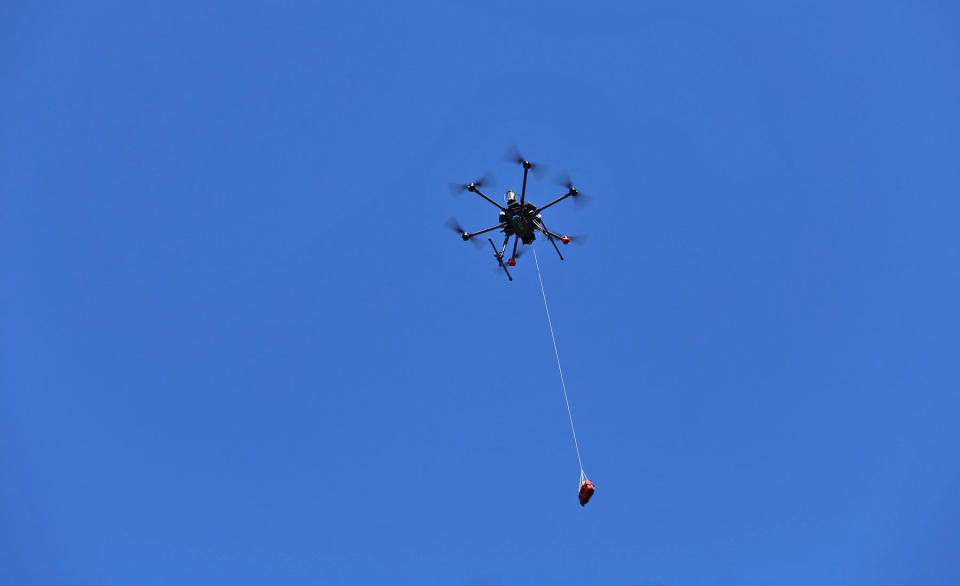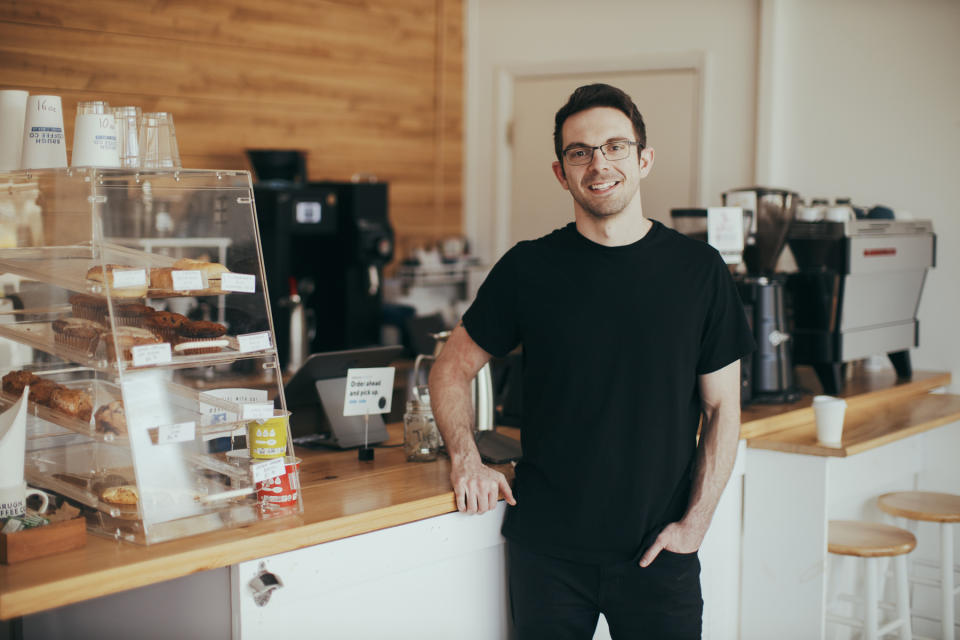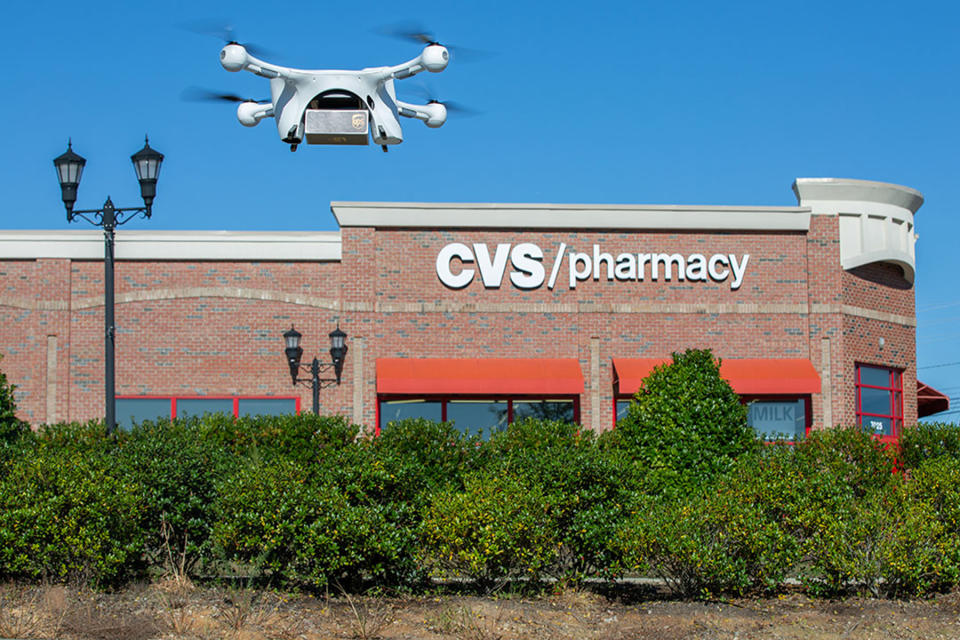Drone deliveries are making their case in a crisis
How Everdrone, Wing, Zipline and Matternet are responding to the coronavirus outbreak.
It feels like drones were built for this moment. The coronavirus pandemic has forced everyone to spend the majority of their time indoors and, where possible, maintain a healthy distance from anyone that doesn’t live in the same building. Companies have introduced numerous measures to minimize the threat and spread of infection. Countless stores have acrylic screens, for instance, and many delivery drivers leave orders at your doorstep. But a robot — or specifically, a drone — offers a potentially safer and quicker method of exchanging goods and services.
It’s no wonder, then, that so many commercial UAV (unmanned aerial vehicle) operators are flourishing at the moment. In a time of crisis, they’re keen to step forward and showcase the impact that drone deliveries can have on society.
Take Matternet. Last month, logistics powerhouse UPS announced that its Flight Forward subsidiary — which uses Matternet's M2 drone system — would support a retirement community in Florida by ferrying medicine from a nearby CVS pharmacy. It’s a short route and, for the initial flights at least, it requires a human concierge to take the delivery to the customer's door. Still, it's a welcome service for people that many would consider high risk and might not be able to leave their home every day.
The delivery area, known as The Villages, houses one of the largest retirement communities in the country. “They basically have a city,” Andreas Raptopoulos, founder and CEO of Matternet told Engadget. That means the company can have a large impact with a single pick-up and drop-off point. Raptopoulos hopes the program will expand to three pharmacies and, perhaps more critically, support multiple routes from each one. Unsurprisingly, he also wants to reach a point where the drones can hover and lower the package at the resident’s doorstep.
“You can really make a difference if you don’t send a human in a van into a location that has a vulnerable population,” Raptopoulos said.

Matternet is starting with 10 to 20 deliveries each day. But if everything goes to plan, the company could facilitate “thousands of deliveries” each month, according to Raptopoulos. “If we can prove the model with one [store] and we see value there, and the economics are working out, then it can be rolled out to multiple [locations],” he added.
The little-known company has been building up to this moment. In March 2017, Swiss Post and Matternet started transporting lab samples between two hospitals in Switzerland. Six months later, the drone maker partnered with Mercedes-Benz on a “technology development program,” which has since wound down. Matternet now supports hospitals in Lugano and Zurich, though both sites were put on pause once the coronavirus outbreak hit. Raptopoulos is confident, however, that services will restart “in the next few weeks.”
The drone supplier is working with medical personnel in the US, too. In August 2018, the company performed some test flights at a WakeMed facility with North Carolina's Department of Transportation (NCDOT). Seven months later, Matternet partnered with UPS for the first time and announced a permanent delivery program at the hospital. The pair have since used the M2 drone to transport more than 3,000 medical samples and specimens.
“Our target is to get to multiple hospitals this year.”
Flights were reduced at the start of the pandemic as hospitals postponed and scaled back procedures that weren't related to COVID-19. But the company’s service has "continued every day uninterrupted," according to Raptopoulos, and started ramping up again as doctors, nurses and technicians acclimate to our strange new reality. “Our target is to get to multiple hospitals this year with that type of transportation system in place,” he explained.
Matternet’s contributions could go even further. NCDOT revealed last month that the company, alongside UPS and an unnamed hospital in Winston-Salem, North Carolina, had proposed a drone program that would deliver medicine, PPE and other types of healthcare equipment during the coronavirus pandemic. Matternet has also spoken with laboratories to see if its drones could help deliver COVID-19 test samples. "The thing that we're hoping to do next, in [addition] to what we're doing with UPS, is see some of that work come out," Raptopoulos told Engadget.

Everdrone is making a similar effort to help the medical community. The emergency response specialist has announced a drone program that will bring Automated External Defibrillators to people in Gothenberg, Sweden, who have gone into cardiac arrest. The scheme, which starts next month, could help bystanders to deliver lifesaving care while they wait for medical professionals to arrive. Everdrone is planning three drone “systems,” each based in a different location, that will cover emergency 112 calls in a 6 km (roughly 4-mile) radius. Once summoned, it will head to the caller’s location and lower the defibrillator from a safe height.
“The method of lowering the defibrillator from the drone with the help of a winch is something we have been developing and testing for a long time,” Mats Sällström, CEO of Everdrone explained. “We have performed countless test deliveries in recent months, and the results show that the method works very well.”
Research conducted in Italy suggests that cardiac arrests have spiked during the coronavirus pandemic. A fast and reliable drone system could, therefore, save lives and relieve some pressure on an already stretched healthcare system.
Everdrone is working with Sweden’s national emergency call center, SOS Alarm, and the Centre for Resuscitation Science at Karolinska Institutet on the program. The company has already completed thousands of test flights and, last July, a fully autonomous delivery between two Gothenberg hospitals.
On the other side of the world, drone operator Zipline is helping medical professionals in Ghana. The company has stepped up its deliveries to ensure hospitals have the products they need and minimize the threat of transmission from truck drivers. Zipline’s system, which uses autonomous gliders instead of quadcopters, has also played a role in distributing personal protective equipment (PPE). At the start of the pandemic, the country had a limited amount — not enough for every doctor and nurse — and only a vague idea about where the first COVID-19 cases might appear. It made sense, therefore, to give Zipline some of the stock and have them act as a centralized distribution hub.

“When there was a suspected case, or they felt a place was a potential hotspot, then we delivered protective clothing to those places only,” Daniel Marfo, General Manager for Zipline’s Ghana operations told Engadget. “It’s allowed them to be able to ration the use of the PPE. Otherwise [they] would have just distributed to places that may never get cases, and then the PPE is just sitting there waiting, whereas other places have more cases and would have run out.”
Zipline’s efforts don’t stop there, though. Early on, Ghana only had two laboratories capable of processing COVID-19 test samples. They were based near cities and, therefore, difficult for people in remote areas to access. Now, Zipline is doing the heavy lifting, getting test samples to its rural hubs — a 30-minute drive, typically, instead of a 12-hour round trip to the city — to fly to the test labs. The initiative is unique because, prior to the outbreak, no company had permission to make routine deliveries into densely populated urban areas with a beyond visual line of sight (BVLOS) system.
“We had to really prove to the civil aviation authorities that we had enough safety systems and measures in place to ensure that we could fly into [the] city center.” Marfo said. “The labs we fly to are all within a five-kilometer radius of the international airports. So as you can imagine, it’s a very high-risk thing to do, from an aviation standpoint. But we were able to prove that we can do it safely.”
“We were able to prove that we can do it safely.”
Zipline has operated in Africa since 2016. It started by transporting critical medicine and blood in the western side of Rwanda before slowly scaling up and expanding to Ghana in April 2019. Earlier this month, the company announced in a tweet that it has delivered more than 100,000 vaccines, units of blood and medications worldwide. The company wants to enter the US, too, and has spoken with Novant Health about delivering PPE and other medical equipment to its campuses in the Charlotte area of North Carolina.
“We’re standing by [and] ready to meet this challenge.” Keller Rinaudo, CEO of Zipline told Wired.

Medical work is only one side of the industry, however. Alphabet subsidiary Wing wants to see drone deliveries used for everything, including fresh bread and hot coffee. The company started with a small service in the outskirts of Canberra, Australia. It then expanded to Helsinki, Finland and Christiansburg — a small town in the US state of Virginia — before launching a second site ‘down under’ in Logan, just south of Brisbane.
Last month, the company announced “a dramatic increase” in the number of customers using its service. “We’ve seen a 350 percent increase in signups globally,” Keith Heyde, the manager for Wing’s operations in Virginia told Engadget. The company made more than 1,000 deliveries in a two-week period, a Wing spokesperson added, helped by a “significant” rise in Virginia orders. Mockingbird Cafe, a bakery based in Christiansburg, joined Wing earlier this year and sold 50 percent more pastries than it would in-store on a normal weekend. Brugh Coffee, another new business on the Wing platform, sold twice as much cold brew as it typically did in-store.
“If I do nothing and I try and fight what’s going on right now, my business will be taken out,” Luke Brugh, co-founder of Brugh Coffee told Engadget. “I think I just understand that’s a part of life. If I want my business to stay around, I have to figure out how to adapt and stay connected with my customers.”
Still, it’s a tough time for Brugh Coffee. The company is an independent roaster and has lost wholesale clients because of the pandemic. Luke still works at the store (the cafe portion is called the Brew Lab), preparing the stock that Wing employees pick up each morning. He also accepts remote orders, submitted through an app called Cloosiv, and leaves them for customers on a table outside. “We’ve been impacted,” he explained. I’ve had to lay off a couple of people, a couple of our part time people.”
The partnership with Wing, then, is a small but indispensable revenue stream. “Everybody in the hospitality industry is struggling right now, and so this just gives us another way to reach our customers,” Brugh added.

The uptick in Wing deliveries isn’t surprising. Many people are stuck at home and battling boredom at the moment. A fresh coffee or bagel can be a rare highlight in an otherwise uneventful week. “If that was something that was in somebody’s routine every day, [Wing] is kind of an opportunity to get it,” Brugh explained. Unsurprisingly, the products that people are buying have changed, too. Demand for toilet paper, snacks and first-aid items, including band aids and eye drops, have surged in Virginia. Anything that can keep a child entertained, such as chalk, has also increased in popularity since the start of the pandemic.
“This is a trying time for kids, as well,” Heyde said. “So being able to order your kid a toy and have a little bit of enjoyment that way is a nice thing we can provide for the community.”
For the average person, there's little downside to a drone delivery service like Wing or the recently launched Matternet, UPS and CVS partnership. That's because — at least for now — there's no extra charge for choosing a UAV over a traditional truck or in-store pick up. "For now, the service is paid for by CVS, and there is not a premium delivery fee paid by the recipient," a Matternet spokesperson told Engadget.
"Wing currently does not charge customers or merchants a delivery fee at any of our locations around the world," a Wing spokesperson added. Is that financially viable long-term? Probably not, however the industry is still nascent and, for now, establishing consumer trust and adoption is arguably more important than short-term revenue.
A fresh coffee or bagel can be a rare highlight in an otherwise uneventful week.
Drone deliveries feel like they were made for the pandemic. But most operators, including Wing, have had to make a few adjustments since the arrival of COVID-19. The Alphabet subsidiary has a work from home policy for anyone that doesn’t need to go outside. Merchant-supplied goods are wiped down and disinfected to eliminate any remnants of the virus. Wing’s warehouse employees, meanwhile, are told to wear protective gloves and face masks, stay six feet away from each other and participate in regular health and temperature checks.
“Say a customer orders a loaf of bread,” Terrance Bouldin-Johnson, Head of Australian Operations at Wing explained, “My team gets that order and it pops up on the screen. They grab the bread, put it into our package and seal it up. They request the drone and walk outside. The drone hovers above and they hook [the package] on. It then flies to the customer, lowers the package and returns. In that entire process they don’t interact with any other human.”

Matternet’s hospital payloads are given a similar wipe down. “Nothing dramatic,” Raptopoulos explained. “Just adding a bit of precaution to make sure we don’t, in that handover, receive or transmit the virus.”
Zipline, meanwhile, is following the World Health Organization (WHO)’s guidelines and encouraging everyone to wear masks both at work and home. It also has two distinct teams with completely separate shifts. That way, if someone were to catch the virus, there’s another shielded unit that can keep working.
Drone deliveries are clearly helpful in a crisis. But they are, for now, a technological rarity that relatively few people around the world can access. That’s because the regulation and public acceptance varies wildly between different countries.
Wing and UPS Flight Forward, for instance, have been granted air carrier certificates by the FAA. Known as Part 135, this crucial clearance allows both companies to fly drones beyond a pilot’s visual line of sight in the US. Without that certificate, companies have to obtain an FAA waiver, which usually mandates a secondary observer or backup aircraft. Some drone operators have been granted this exception by participating in the government’s Unmanned Aircraft Systems (UAS) Integration Pilot Program (IPP), a research program that seeks to “safely explore the further integration of drone operations.” (Wing and UPS Flight Forward have both been involved in the IPP scheme.)
But there are complications. As Supply Chain Drive notes, airline operators typically use planes that have received their own certification. Matternet drones haven’t received this clearance yet — though the company is going through the process now — which limits where UPS Flight Forward can operate. “If you have a type certified aircraft, and we expect to have it here [with the M2 system], and then UPS has their Part 135 certificate, that allows you to operate on a much larger scale and at a much faster pace of authorization from the FAA,” Raptopoulos said.
Back in December, the FAA proposed a remote ID system to monitor and safely integrate drones into national airspace. DJI called the system “deeply flawed” and overly “complex, expensive and intrusive.” Nevertheless, the FAA has pushed forward and selected eight companies, including Wing, to help it refine the exact technology requirements. Commercial drone companies will need to keep up, therefore, with the evolving rules and regulations to merely maintain their operations in the US. And that’s just one country. Every region has unique policies and societal expectations to grapple with. It’s no surprise, then, that drone deliveries have taken so long to truly take off worldwide.
The coronavirus pandemic could grease the wheels of change. Policymakers are generally moving faster and green-lighting projects that could help the fight against COVID-19. In addition, more people are now using drone delivery services — both in a medical and consumer capacity — which will increase awareness and, perhaps, acceptance.
“The reason we’ve been pursuing drone delivery for several years now is because we feel that there’s massive upside for the public in the end,” Raptopoulos said. “There’s massive value for society. And crises like now just make this crystal clear.”
Bouldin-Johnson added: “If we have five more deliveries than we would’ve normally had, and all of those people have great experiences, then that means we have five more people that like us than we would have had if COVID-19 wasn’t happening, right?”

